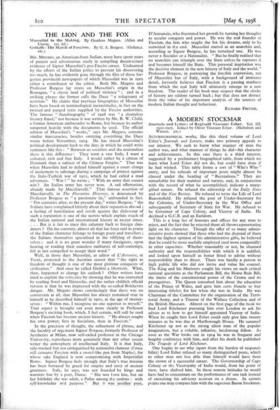THE LION AND THE FOX
Goliath: The March of Fascism. By G. A. Borgese. (Gollancz. 16s.)
Mn. MEGARO, an American-born Italian, must have spent years of patient and adventurous study in compiling documentary evidence of Signor Mussolini's pre-Fascist career. Undaunted by the efforts of the Italian poliee to prevent his discovering too much, he has evidently gone through the files of those for-. gotten provincial newspapers of which Mussolini was in turn either a contributor or the editor. Both Mr. Megaro and Professor Borgese lay stress on Mussolini's origin in the Romagna, "a classic land of political violence " ; and in a striking phrase the former calls the Duce "a voluptuary of activism." He claims that previous biographies of Mussolini have been based on terminological inexactitudes, in fact on the twisted and purged texts supplied by the Fascist authorities. The famous " Autobiography " of 1928 was "a shameless litcrary fraud," not because it was written by Mr. R. W. Child, a former American ambassador to Rome, but because its author tampered heavily with the documents he used. The official edition of Mussolini's "works," says Mr. Megaro, contains similar inaccuracies, besides omitting everything the Duce wrote before November, 1914. He has traced Mussolini's political development back to the days in which he could write sentences like this : "Between us socialists and the nationalists there is this difference : They want a vast Italy, I want a cultured, rich and free Italy. I would rather be a citizen of Denmark than a subject of the Chinese Empire." That was when Mussolini had to defend himself against a court charge of incitement to sabotage during a campaign of protest against the halo-Turkish war of 1911, which he had called a mad adventure. " War ? " he wrote ; "With an army that cannot win ? An Italian army has never won. A sad affirmation, already made by Macchiavelli." That famous assertion of Macchiavelli, in The Florentine Histories, is denounced by Professor Borgese as "a passionate lie," unfounded in fact. "For centuries after, to the present day," writes Borgese, "the Italians have complained bitterly about their reputation abroad ; a feeling of humiliation and revolt against the dishonour of such a reputation is one of the secrets which explain much of the Italian national and international history in recent times. . . . But is it fair to trace this calumny back to foreign slan- derers ? On the contrary, almost all that has been said in praise of the Italian character belongs to foreign poets and travellers ; the Italians themselves specialised in the vilifying of them- selves ; and it is no great wonder if many foreigners, upon hearing or reading their ceaseless outbursts of self-contempt, felt at last compelled to accept their word."
Well, in those days Mussolini, as editor of L'Avvenire, at Trent, protested to the Austrian censor that "the right to freedom of thought is one of the most glorious conquests of civilisation." And once he called Giolitti a liberticide. What, then, happened to change his outlook ? Other writers have tried to explain the volte-face by showing that he was converted by reading Sorel and Nietzsche, and the rather childish official version is that he was impressed with the so-called Bolshevist danger. Mr. Megaro shows convincingly that there was no conversion at all, that Mussolini has always remained true to himself as he described himself in 1910, at the age of twenty- seven : "Within me, I recognise no one superior to myself." That aspect is brought out even more dearly in Professor Borgese's exciting book, which, I feel certain, will still be read when Fascism has become ancient history. "He always sought his own power, first in Socialism, then in Fascism."
In the precision of thought, the refinement of phrase, and the lucidity of argument Signor Borgese, formerly Professor of Aesthetics at Milan, now self-exiled professor in the Chicago University, reproduces more genuinely than any other recent writer the atmosphere of intellectual Italy. It is that Italy, side-tracked but not extinguished by nationalist clamour (Croce still censures Fascism with a sword-like pen from Naples), for whose sake England is now compromising with Imperialist Rome. Signor Borgese feels strongly that Italy's true mission has been betrayed by greed for empire and envy of ancient greatness. Italy, he says, was not founded by kings and warriors but by a poet, Dante. "She was torn late, but on her birthday she was adult, a Pallas ,among the nations : with self-knowledge anti Rurpose." But it was another- poet,
D'Annunzio, who frustrated her growth by turning her thoughts to secular conquest and power. He was the real founder of Fascism, the lion who taught the fox his dreams, only to be outwitted in -the end. Mussolini started as an anarchist and, according to Signor Borgese, he has remained one. He was never a Socialist or a Nationalist. "But he finally realised that no anarchist can triumph over the State unless he captures it and becomes himself the State. This personal inspiration was the decisive element in the new history of Italy and the world." Professor Borgese, in portraying the forcible conversion, not of Mussolini but of Italy, with a background of immense detail, fervently believes that Fascism is a passing madness from which the real Italy will ultimately emerge to a new freedom. The reader of his book may suspect that the clocks of history are seldom turned back ; but that does not detract from the value of his important analysis of the sources of modern Italian thought and behaviour.
RICHARD FREUND.


































































 Previous page
Previous page